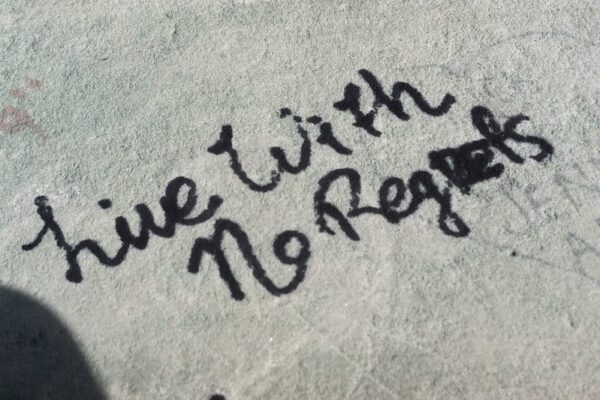As I sit in my pajamas, editing articles about Sterling Scholar, theater competitions and junior prom, I’m left regretting a lot about my high school experience. I am particularly troubled by all the things I shoulda’, woulda’, coulda’ done.
I shoulda’ stuck with Sterling Scholar. The intense preparation, interviews and self-aggrandizement scared me away, but I always wonder what would’ve happened if I’d held on to that pride for English and seen it through. I woulda’ taken the chance to be involved in musical theater. They didn’t have it at my high school, but I woulda’ driven far to practice and compete in drama. I coulda’ been in charge of my junior prom. My class recognized that I could be a good, artistic leader and nominated me to plan decorations, dances and activities at prom, and I chose not to run.
But I shoulda’, woulda’, coulda’.
Living with All of Our Regrets
I’m willing to bet that everyone reading this has a shoulda’, woulda’, coulda’ of their own. We look at our lives today and wonder if we’d done things differently, how things would have changed. Particularly at times when we’re reminded of our past chances, we tend to grapple with feelings of regret.
Writer and TED Talk presenter Kathryn Shulz said this regret is difficult in this day and age. “We’re incredibly used to not having to face life’s hard realities, in a sense,” she says. We live in a world of cancel culture, “control Z,” no regrets, undo. It pains us to have come so close to things that we just can’t change.
But “the point isn’t to live without any regrets. The point is to not hate ourselves for having them,” Shulz said. That’s because regret can be really good for us.
Psychologist James Tobin wrote, “Past experience lingers as a cautionary tale, paving the way for future better choices and actions likely taken with more forethought, awareness, and wisdom.” Intriguingly, psychological research shows that though people view regret as distressing, they still rate it as a “positive” experience. In addition, a marked difference that sets psychopaths apart is their inability to feel regret.
Regret, sources show, is one of the things that makes us human.
Focusing on the Things that Make Life Worth Living
Shulz said that even though we shouldn’t hate ourselves for our regrets, we also shouldn’t dwell on them.
Many of our regrets, though not all of them, are not nearly as bad as we think they are. My regrets in this article, for example, have to do with things I did, or didn’t do, in high school. And who even really cares about high school?
In fact it may sound redundant, but researchers have found that the most important things in our lives are not our popularity, career successes or accomplishments. The things that really make life worth living — that extend lives — are our relationships.
It turns out that, according to an 80-year study done by Harvard University, “loneliness kills. It’s as powerful as smoking or alcoholism.”
“Researchers who have pored through data,” a Harvard article about the study read, “found a strong correlation between men’s flourishing lives and their relationships with family, friends, and community. Several studies found that people’s level of satisfaction with their relationships at age 50 was a better predictor of physical health than their cholesterol levels were.”
Genetics, little health issues, accomplishments, and personality didn’t really matter as much in the long run.
The Potential in Shoulda’ Woulda’ Coulda’
Looking back I notice that every one of my shoulda’, woulda’, coulda’s in high school led me to better relationships. The opportunities I found made me a better professional, wife, sister and friend in the long run.
I didn’t do Sterling Scholar, but I did apply for The Byway. Because I did that, I get to show the world that I’m really so passionate about the written word, and learn a lot about communicating in the process. I didn’t do drama in high school, but I did sing and dance and play for my family. In reaction, I taught my siblings to love music, and it helped me build a strong relationship with my brother, who now lives far away. I chose not to be in charge of prom, but I did lead my high school class in gathering their pictures for the yearbook and highlighting their many personalities in my salutatorian speech. Because of the relationships I built, I have a couple good friends I still keep in touch with today.
As I’ve found, every shoulda’, woulda’, coulda’ has the potential to bring great experiences and stronger relationships tomorrow. There is more to life than just the opportunities you didn’t take, or what you did in high school; how you performed in a particular job interview, or how a past relationship ended. Shoulda’ woulda’ coulda’s make us human and often lead to better relationships in the long run.
As Shulz finished, “We need to learn to love the flawed, imperfect things that we create,” or don’t create, I would add, “and to forgive ourselves for creating them.” And we can all choose to see the lasting beauty in the things we regret.
– by Abbie Call
Feature image caption: “Live with No Regrets” may not always be the best advice. In fact, there can be a lot of beauty in remembering the things we regret. Courtesy Flickr.

Abbie Call – Cannonville/Kirksville, Missouri
Abbie Call is a journalist and editor at The Byway. She graduated in 2022 with a bachelor’s degree in editing and publishing from Brigham Young University. Her favorite topics to write about include anything local, Utah’s megadrought, and mental health and meaning in life. In her free time, she enjoys reading, hanging out with family, quilting and hiking.
Find Abbie on Threads @abbieb.call or contact her at [email protected].

